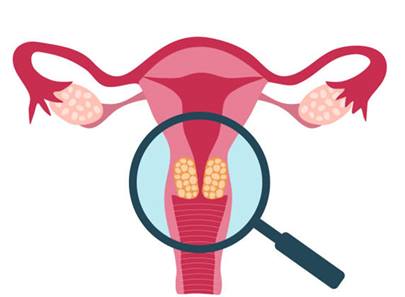Cervix Structure and Function
Cervix is a part of the female reproductive system. It’s a small organ located at the lower end of the uterus and made up of strong muscles. Cervix connects between uterus (womb) and the vagina (birth canal).

What is Cervical Cancer?
A type of cancer develops in cervix but can invade other organs and spread throughout the body. Usually starts without symptoms as abnormal changes in the cervix tissues called (pre-cancer cells), if not removed or destroyed will continue growing uncontrollably forming tumors.
Cervical cancer grows slowly and takes years to develop. Normally it takes 15-20 years for the pre-cancer cells to become cancer, and 5-10 years for women with weakened immune system.
All women are at risk of developing cervical cancer but often diagnosed in young women at the age of 30s. Its highly curable if diagnosed and treated at an early stage.
Cervical Cancer Facts and Statistics
Worldwide 2022
- Cervical cancer is the fourth most common cancer in women and the fourth to cause cancer deaths among women.
- By 2022, about 662,301 women were diagnosed with cervical cancer and 348,874 women died from the disease.
Abu Dhabi Emirate 2023
-
Cervical cancer is the fourth common cancer among women in Abu Dhabi, and the third to cause cancer deaths among them.
Risk Factors of Cervical Cancer
Human Papillomavirus (HPV) infection is the leading risk factor for cervical cancer. Responsible for 95% of all cases.
- Long-term use of contraceptive pills (5 years and more).
- Multiple full-term pregnancies (3 times and more).
- First full-term pregnancy at young age (under 17 years)
- Weakened immune system (Have immunity condition such as AIDs or use of immune suppressive medicines).
- Family history with cervical cancer (mother, sister, or daughter).
- Smoking tobacco products and exposure to second-hand smoke.
- Age: more common in young women (30s).
- Obesity may pose challenges to perform screening tests which delays early detection.
Signs and Symptoms of Cervical Cancer
Cervical cancer usually has no symptoms in the early stages. Symptoms usually tend to appear when the cancer has reached an advanced stage.
- Unusual vaginal bleeding/spotting (between periods, after intercourse, after menopause).
- Longer and heavier periods.
- Unusual vaginal discharges.
- Persistent pain in pelvis, legs, and back.
- Pain during intercourse.
- Unexplained weight loss, fatigue, loss of appetite.
- Swelling in legs.
These symptoms can be caused by other conditions and not necessarily cervical cancer. Still, it’s important to see a healthcare provider for proper diagnosis if any noticed. Ignoring symptoms can allow cancer to grow and reduce the chances of successful treatment.
Cervical Cancer Prevention
1. Vaccination against HPV (main cause of cervical cancer)
Safe and effective way to protect women from cervical cancer and other cancers caused by HPV.
- Vaccine recommended for all females from age 15 – 26 years old.
- Approved HPV vaccines to protect from cervical cancer: Cervarix and Gardasil.
- Administered once in a lifetime, through scheduled series of 2 injections (<15 yrs), or 3 scheduled injections (15 ≥ yrs).
Abu Dhabi Efforts
HPV vaccine (Gradasil9) administered for school-age students (Grade 8/year 8) for both males and females in public and private schools as part of the Expanded Program on Immunization (EPI) - School Vaccination. The vaccine is given in 2 doses for students age (<15 yrs), or 3 doses for students age (15 ≥ yrs).
2. Regular Screening and Early Detection of Cervical Cancer (Pap Smear Test)
The test helps find any abnormal changes in the cervix tissues (pre-cancerous cells) that can turn into cancer if left untreated.
- It’s recommended for women from age 26 – 56 years old who meet the test eligibility criteria. Eligible women are advised to maintain regular screening with a Pap Smear Test whether HPV vaccinated.
3. Avoid tobacco products and exposure to passive smoking
|
Cervical Cancer screening services available through
|
 |
Awareness Materials:
